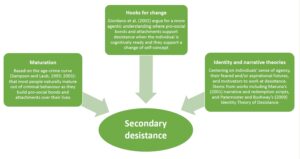Overall positive report
In a rare piece of good news for the probation service, today’s (23 June 2017) inspection report: The Work of Probation Services in Courts. finds that court work (delivered by the National Probation Service, the public arm of the modern probation service) has:
Improved noticeably over the past year and consistently good advice was being given to sentencers by probation staff.
Context
Probation services have for many years provided advice and information to courts to help judges and magistrates decide on the right sentence. Under the government’s Transforming Rehabilitation programme, probation services changed. In June 2014, they were divided into a new public sector National Probation Service (NPS) and 21 new privately owned Community Rehabilitation Companies (CRCs). The NPS assumed responsibility for all advice and information provided to courts.
Alongside Transforming Rehabilitation, the Ministry of Justice is modernising the criminal justice system. Historically, courts adjourned for three weeks or more so that pre-sentence advice could be assembled. New expectations are that most advice to court can be given on the day in cases where a defendant pleads guilty, to allow for an immediate sentence decision. In response, the NPS implemented nationwide arrangements for a speedier approach.
Court Workload
The inspection report sets out the volume of work undertaken by the NPS in court:
- 158,305 Pre-sentence reports prepared for magistrates’ and Crown Courts (July 2015 to June 2016)
- 100% — The percentage of pre-sentence reports completed by the NPS within the timescales set by the court, including remands in custody (April to September 2016)
- 31,342 (29%) Community sentences enforced in court due to failure to comply, further offences or other reasons (October 2015 to September 2016)
- 71% Of community sentences ran their full course successfully or were finished early for good progress (October 2015 to September 2016)
- 48% Decline in commencements of accredited programmes (2009/2010 to 2015/2016)
- 44% Percentage increase in the use of rehabilitation activity requirements for community orders during the period of April-June 2015 to April-June 2016
Findings
The inspectors’ main findings are reproduced below:
- Inspectors found strong arrangements between the NPS and the courts, though working arrangements with CRCs were less well developed.
- Pre-sentence oral reports delivered on the day were well regarded by sentencers. Inspectors found satisfactory (or better) arrangements to obtain information regarding child protection and domestic abuse.
- Worryingly, accredited programmes to prevent reoffending were recommended by the NPS relatively infrequently, despite clear evidence to support their use.
- Short written reports were not always sufficiently thorough in their assessments of the risks an individual could pose.
- NPS enforcement work was of a high quality, but many sentencers expressed concern about cases where CRCs allowed an individual too many absences before breaching them and taking them back before the court.
- NPS hardware and software were dated, making staff less efficient, but inspectors did see the effective use of video link in some courts.

Recommendations
Key recommendations made by inspectors include the NPS:
- Providing sentencers with a sufficient assessment of the Risk of Serious Harm in all cases,
- Training court staff to consider accredited programmes appropriately, and
- Establishing strategies with CRCs to improve confidence in the delivery of community sentences.
Inspectors also recommended that CRCs should provide up-to-date information to the NPS and courts on what courses, work and activities they can deliver through rehabilitation activity requirements and accredited programmes.
Chief Inspector, Dame Glenys Stacey praised the good progress but highlighted the importance of ensuring that accredited programmes (based on a solid evidence base) are not unintentionally removed from core probation practice:
I am glad to report that probation services in courts have got much better over the past year. Arrangements between the National Probation Service (NPS), Community Rehabilitation Companies (CRCs) and courts have bedded down and probation providers now need to give judges and magistrates more confidence in how the community sentences they order are actually delivered.
The NPS should be commended for getting good systems in place to provide information the court needs about a defendant’s circumstances from local authorities and the police quickly. Competent and motivated staff are in court daily, enabling sentences to be passed swiftly and safely.
That said, the NPS needs to improve some of its risk assessments. What is more, it is baffling that so few reports call for someone to complete an accredited programme when evidence shows that they’re effective, and fewer still are actually ordered by the courts. No-one wishes to see high-quality services disappear by simple neglect.









One Response
“that said, the NPS needs to improve some of its risk assessments. What is more, it is baffling that so few reports call for someone to complete an accredited programme when evidence shows that they’re effective, and fewer still are actually ordered by the courts. No-one wishes to see high-quality services disappear by simple neglect.”
That is because it is done through CRC and they charge an arm and a leg for it so not worth doing, also limited point putting Licence/PSS programme if they are still chaotic as setting up to fail.